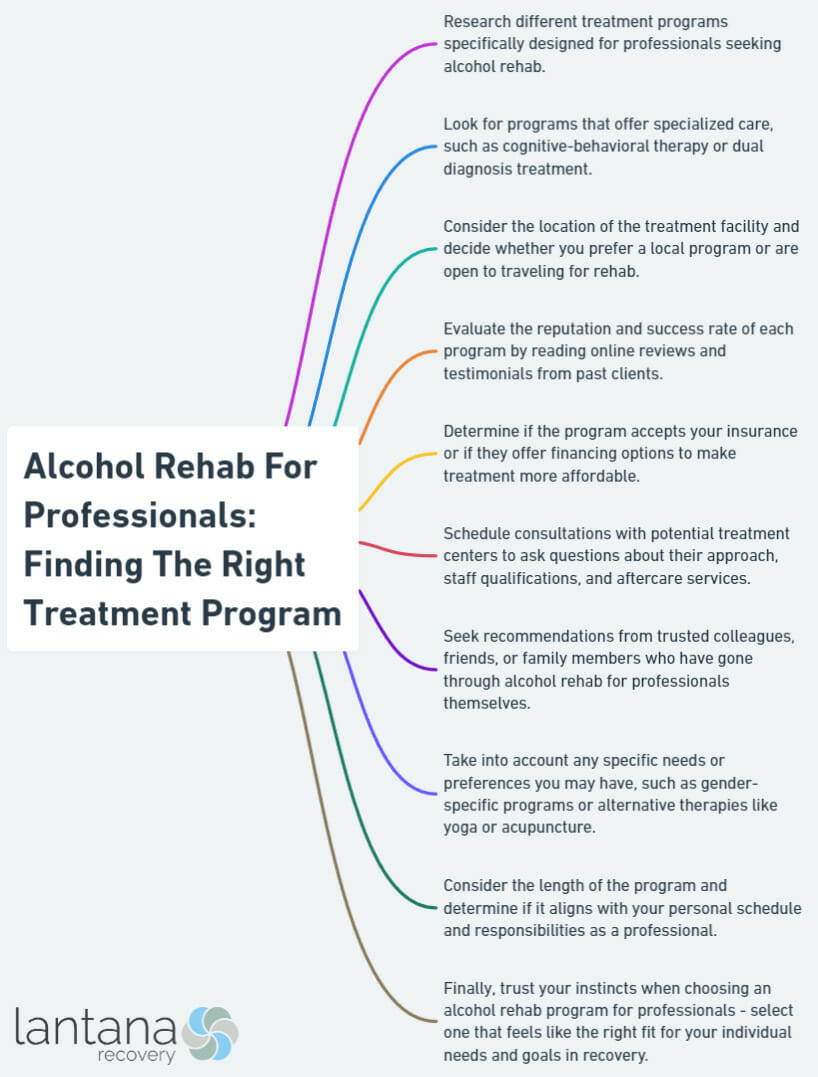The modern professional world can be a high-pressure environment, often leading to increased levels of stress and anxiety. In some cases, this can result in substance abuse, particularly alcohol addiction. But what if there was a specialized treatment program tailored specifically to the unique challenges faced by professionals? Enter the world of alcohol rehab for professionals – a program designed to address the specific needs and concerns of high-functioning individuals in demanding careers. In this blog post, we will delve into the importance of specialized alcohol rehab for professionals, the types of programs available, components of effective treatment plans, legal protections, and inspiring real-life success stories.
Short Summary
-
Specialized alcohol rehab programs provide tailored support for professionals to achieve long-term sobriety and regain control of their lives.
-
Effective alcohol rehab programs feature medical detox, evidence-based therapies, and continuing aftercare support.
-
Real life success stories demonstrate the importance of having a strong support system in achieving & maintaining sobriety.
The Need for Specialized Alcohol Rehab for Professionals

Professionals in high-pressure careers often face unique challenges that contribute to the development of substance addiction. The workplace can be a breeding ground for chronic stress, burnout, and mental health issues, all of which can lead to substance abuse, including alcohol abuse and drug abuse.
Can you go to rehab for alcohol? Short answer, yes, specialized alcohol rehab programs offer tailored support to help professionals overcome these challenges and regain control of their lives.
High-Stress Work Environments
High-stress work environments can significantly impact alcohol abuse among professionals, leading to a cycle of chronic stress, burnout, and mental health issues. Unfortunately, this can result in the development of substance use disorders, such as alcohol addiction.
Seeking help right away is crucial to breaking this cycle and overcoming addiction. Dual diagnosis addiction treatment programs are tailored to address the challenges, needs, and risks of regular stress and trauma. New Start Recovery Solutions specifically offers these types of programs.
Confidentiality and Privacy Concerns
Maintaining confidentiality and anonymity is essential for professionals seeking addiction treatment. Stigma associated with seeking help can still be present, and professionals may worry about their reputation and career. Confidentiality and privacy are vital when seeking alcohol rehab for professionals to ensure that treatment remains confidential and records stay private, especially for healthcare professionals who may face additional scrutiny.
Laws and policies, such as the HIPAA Law, protect confidentiality and privacy in alcohol rehab, creating a safe and trustworthy atmosphere for professionals to receive the care they need.
Types of Alcohol Rehab Programs for Professionals

Professionals seeking alcohol rehab have various options tailored to their unique needs, such as:
-
Residential inpatient programs
-
Outpatient programs
-
Intensive outpatient programs (IOP)
-
Dual diagnosis programs
-
Executive rehab programs
These programs provide the necessary support and guidance for professionals to overcome their addiction with the help of a dedicated treatment team at a drug rehab center in Charleston like Lantana Recovery, following an individualized treatment program.
The length of stay in rehab for professionals can vary, ranging from 30-90 days or more, depending on factors such as insurance coverage, individual needs, and program availability.
Executive Inpatient Rehab
Executive inpatient rehab programs offer professionals the opportunity to enjoy private accommodations, receive personalized care, and focus on achieving a healthy work-life balance. Assessments in executive rehab programs investigate substance use disorder and co-occurring mental health issues to ensure successful recovery.
During their stay in an inpatient rehab program, professionals can focus on recovery without outside distractions and connect with peers going through a similar struggle, providing invaluable support and a sense of community.
Outpatient Treatment
Outpatient treatment offers professionals the opportunity to keep up with their work while receiving treatment, providing the convenience of flexible scheduling and the comfort of receiving treatment in a familiar environment. Outpatient treatment is a convenient way to receive recovery support. It offers accountability and therapy in order to help individuals meet their goals while balancing professional or personal responsibilities.
Services in inpatient or outpatient treatment can include case management, individualized treatment plan, counseling, family therapy, patient education, crisis intervention, and recovery services at an outpatient rehab.
Dual Diagnosis Treatment
“The existence of two or more different disorders in the same patient is referred to as comorbidity. Patients with comorbid AOD and psychiatric disorders are said to have dual disorders, or a dual diagnosis” (The Challenge of Dual Diagnosis, Woody, 1996.) Dual diagnosis treatment is an effective approach that helps address both mental health disorders and substance use disorders simultaneously. This comprehensive care helps manage both conditions and promotes recovery by identifying and addressing the underlying issues contributing to both conditions.
Dual diagnosis treatment brings about improved mental health, decreased substance use, enhanced quality of life, and greater chances of long-term recovery.
Components of Effective Alcohol Rehab Programs for Professionals

Successful drug and alcohol rehab programs designed for professionals include key components such as medical detox, evidence-based therapies, and continuing aftercare support. These components work together to help professionals achieve lasting sobriety and regain control of their lives.
Medical detox is the first step in the process, and it helps to reduce the physical symptoms of the disease.
Medical Detox
Medically supervised detox is an essential first step in the rehab process for professionals, providing a safe way to remove alcohol from the body and manage withdrawal symptoms. Medical detox involves a medical evaluation to assess the individual’s physical and psychological health, followed by the administration of medications to help manage withdrawal symptoms.
The individual is then closely monitored by medical professionals to ensure their safety and comfort throughout the process.
Evidence-Based Therapies
Various therapeutic modalities, including holistic therapies, are commonly used in alcohol rehab programs for professionals, such as cognitive-behavioral therapy (CBT), motivational interviewing, and group therapy. CBT can help identify and challenge negative thought patterns and behaviors, allowing individuals to take control of their mental health and improve it.
Motivational interviewing is a type of counseling that helps explore and resolve ambivalence about changing behavior, ultimately leading to positive changes. Group therapy provides the opportunity for individuals to benefit from the support and feedback of others in the group and address issues together.
Aftercare Support
Aftercare support is an invaluable type of ongoing treatment service provided to individuals in recovery from drug addiction after achieving initial sobriety. As stated by James R. McKay in Impact of Continuing Care on Recovery from Substance Use Disorder, many experts widely recognize that ongoing care plays a crucial role in the successful treatment of substance use disorder, especially for individuals with more severe issues. It helps individuals maintain sobriety and provides support as they transition from a structured treatment program to independent living.
Resources for aftercare support can help stay on track with recovery, including outpatient treatment, therapy, 12-step groups, and other resources.
Legal Protection for Professionals Seeking Alcohol Rehab

Professionals seeking alcohol rehab have legal protections in place to support their recovery journey. The Americans with Disabilities Act (ADA) safeguards the rights of people with disabilities, including those recovering from addiction to alcohol, opioids, and other substances.
Additionally, the Family and Medical Leave Act (FMLA) ensures that professionals can take job-protected leave for medical reasons, such as seeking addiction treatment.
Choosing the Right Alcohol Rehab Program for Professionals

When choosing an alcohol rehab program, it is essential to consider factors like location, cost, and treatment approach. The ideal location should be tailored to the individual’s needs and preferences, taking into account factors such as proximity to family and friends, access to transportation, and availability of aftercare support.
The cost of an alcohol rehab program can vary, for example, alcohol rehab for low-income professionals may be different from extremely personalized care. So, researching different programs and considering insurance coverage and payment options is crucial to getting the best value. Treatment approaches used in alcohol rehab programs typically include a combination of evidence-based therapies to help make positive changes.
Real-Life Success Stories of Professionals in Recovery

Professionals in recovery are inspiring individuals who have triumphed over alcohol addiction and are now living fulfilling and successful lives. One professional in recovery found an understanding employer who provided them with essential tools to remain sober. Another professional was able to find a treatment program that enabled them to keep working while in recovery.
Having a strong support system, including a supportive employer, family, and friends, can make a huge difference and be incredibly beneficial in the recovery process.

Summary
Throughout this blog post, we have explored the importance of specialized alcohol rehab for professionals, the types of programs available, components of effective treatment plans, legal protections, and inspiring real-life success stories. It is clear that professionals in high-pressure careers face unique challenges that require tailored support and treatment programs designed specifically for their needs. With the right treatment approach, support system, and determination, professionals can successfully overcome alcohol addiction and rebuild their careers and personal lives.
Frequently Asked Questions
What are the 4 pillars of rehab?
Drug addiction recovery is supported by the four pillars of health, home, purpose, and community, as well as the principals of harm reduction, prevention, treatment, and enforcement.
These four pillars and principals provide a comprehensive approach to addressing the issue of drug addiction. They focus on providing support to those in recovery, while also working to prevent and reduce the harms associated with drug use.
Harm reduction focuses on reducing the risks.
What two programs can provide support for those with alcohol problems?
Alcoholics Anonymous (AA) and other 12-step programs are effective resources for individuals struggling with alcohol issues, providing invaluable peer support and guidance on the path to recovery.
These programs offer a safe and supportive environment for individuals to share their experiences and receive advice from peers who have been through similar struggles. They also provide a structure for individuals to work through their issues and develop a plan for long-term sobriety.
What are the unique challenges faced by professionals in high-pressure careers?
High-pressure careers can be difficult to navigate, often resulting in chronic stress, burnout, mental health issues, and an increased risk of alcohol abuse.
These issues can have a serious impact on an individual’s quality of life, leading to decreased productivity, strained relationships, and a lack of motivation. It is important to recognize the signs of stress and burnout and take steps to manage them.
What types of alcohol rehab programs are available for professionals?
Professionals have access to alcohol rehab programs tailored to their individual needs, including executive inpatient rehab, outpatient treatment, and dual diagnosis treatment.
These programs provide a comprehensive approach to recovery, addressing both the physical and psychological aspects of addiction. They also provide a supportive environment for individuals to learn the skills needed to maintain sobriety and live a healthy lifestyle.
What legal protections are available for professionals seeking alcohol rehab?
Professionals seeking alcohol rehab are protected by the Americans with Disabilities Act (ADA) and the Family and Medical Leave Act (FMLA), giving them the ability to seek treatment without fear of negative repercussions.
These laws provide a safety net for those seeking help, allowing them to take time off from work and receive the necessary treatment without fear of job loss or other repercussions.









